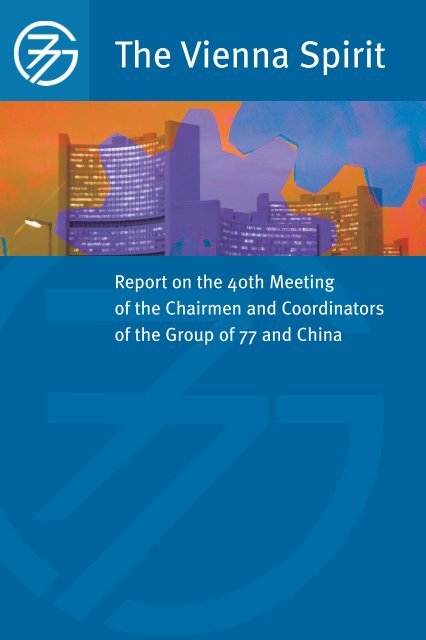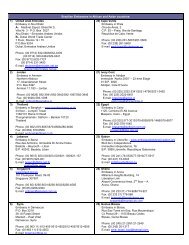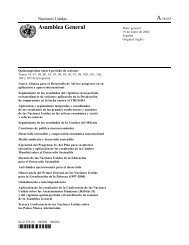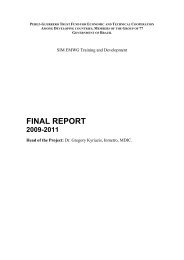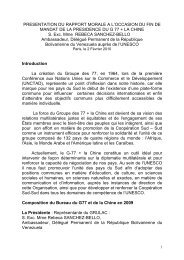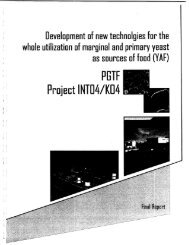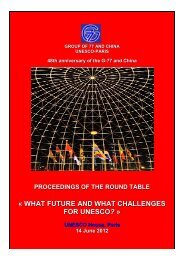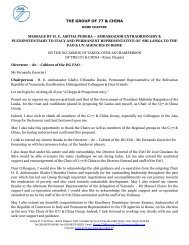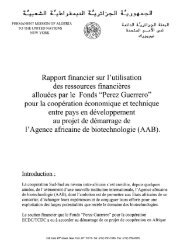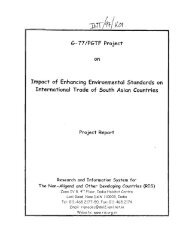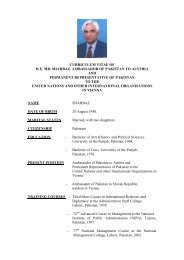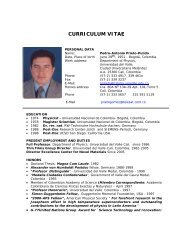The Vienna Spirit - The Group of 77
The Vienna Spirit - The Group of 77
The Vienna Spirit - The Group of 77
- No tags were found...
Create successful ePaper yourself
Turn your PDF publications into a flip-book with our unique Google optimized e-Paper software.
<strong>The</strong> <strong>Vienna</strong> <strong>Spirit</strong>Report on the 40th Meeting<strong>of</strong> the Chairmen and Coordinators<strong>of</strong> the <strong>Group</strong> <strong>of</strong> <strong>77</strong> and China
<strong>The</strong> <strong>Vienna</strong> <strong>Spirit</strong>Report on the 40th Meeting<strong>of</strong> the Chairmen and Coordinators<strong>of</strong> the <strong>Group</strong> <strong>of</strong> <strong>77</strong> and China<strong>Vienna</strong>, 2007
<strong>The</strong> <strong>Vienna</strong> Chapter <strong>of</strong> the <strong>Group</strong> <strong>of</strong> <strong>77</strong> and China wishes to express its gratitude to theDirector-General <strong>of</strong> the United Nations Industrial Development Organization, Mr. Kandeh Yumkella,and his staff, for co-hosting this important event, as well as for their invaluable support. We are alsograteful to Mr. Mohamed ElBaradei, Director General <strong>of</strong> the International Atomic Energy Agency;Mr. Antonio Maria Costa, Director-General <strong>of</strong> the United Nations Office at <strong>Vienna</strong> and Executive Director<strong>of</strong> the United Nations Office on Drugs and Crime; Mr. Mohammed Barkindo, Acting for theSecretary-General <strong>of</strong> the Organization <strong>of</strong> Petroleum Exporting Countries; and Mr. Suleiman J. Al-Herbish,Director-General <strong>of</strong> the OPEC Fund for International Development, for their generous hospitality, andfor their interest in and support to the ideals <strong>of</strong> the <strong>Group</strong>.This publication has been prepared under the overall direction <strong>of</strong> His Excellency AmbassadorHoracio Bazoberry, Permanent Representative <strong>of</strong> Bolivia and Chairman <strong>of</strong> the G-<strong>77</strong> <strong>Vienna</strong> Chapterduring 2006 and Mr. Aegerico Lacanlale, Director, Strategic Planning and Coordination <strong>Group</strong>.Mr. Paul Hesp, UNIDO consultant has prepared this report and was assisted by Ms. Annemarie Heuls,Office <strong>of</strong> the Chairman <strong>of</strong> the G-<strong>77</strong> <strong>Vienna</strong> Chapter.
ForewordAmbassador Dumisani S. Kumalo, Chairman <strong>of</strong> the G-<strong>77</strong> during 2006.<strong>The</strong> meetings <strong>of</strong> the Chapters <strong>of</strong> the <strong>Group</strong> <strong>of</strong> <strong>77</strong> and China represent aresponse to the need for coordination among the different United Nationslocations where the <strong>Group</strong> is operating. This coordination has strengthenedthe activities <strong>of</strong> the <strong>Group</strong> <strong>of</strong> <strong>77</strong> and China, especially in terms <strong>of</strong> promotingour positions in the international arena. It is a remarkable coincidence thatthe 40th meeting <strong>of</strong> the Chairmen/Coordinators <strong>of</strong> the <strong>Group</strong> <strong>of</strong> <strong>77</strong> and Chinawas hosted for the first time by the <strong>Vienna</strong> Chapter <strong>of</strong> the <strong>Group</strong> in the yearthat the United Nations Industrial Development Organization (UNIDO) celebratedits establishment 40 years ago.For the last four decades, UNIDO has supported many developing countriesin promoting their industrial development and formulating strategies to stimulatethe growth <strong>of</strong> trade and technology for development. UNIDO has adaptedits responses to the changing environment <strong>of</strong> industrial development and therequirements <strong>of</strong> developing countries, with a particular focus on three thematicareas <strong>of</strong> poverty reduction: productive activities, trade capacity-building,and energy and environment. UNIDO has further demonstrated particularattention to South-South cooperation by increasing its efforts to mobilizeresources and opportunities to implement effective cooperation among developingcountries. <strong>The</strong> Organization plays a vital role in the field <strong>of</strong> private sectordevelopment, productivity, growth, trade capacity-building and sustainabledevelopment. While much more work remains to be done before the globalcommunity achieves the Millennium Development Goals, UNIDO has madegreat contributions to progress.We are very proud <strong>of</strong> these 40 years <strong>of</strong> support and the strategic partnershipbetween the <strong>Group</strong> <strong>of</strong> <strong>77</strong> and China and UNIDO. We look forward to continuingour valuable cooperation in the implementation <strong>of</strong> the developmentagenda, particularly in the field <strong>of</strong> South-South Cooperation, which is a crucialmodality for achieving the Millennium Development Goals. <strong>The</strong> <strong>Group</strong><strong>of</strong> <strong>77</strong> and China reiterates its full support for the mandate <strong>of</strong> UNIDO.Ambassador Dumisani KumaloPermanent Representative <strong>of</strong> South Africa to the United NationsChairman <strong>of</strong> the <strong>Group</strong> <strong>of</strong> <strong>77</strong> New Yorkiii
List <strong>of</strong> acronymsBWI Bretton Woods InstitutionsCCPCJ Commission on Crime Prevention and Criminal JusticeCND Commission on Narcotic DrugsCOPUOS Committee on the Peaceful Uses <strong>of</strong> Outer SpaceCTBTO Comprehensive Nuclear-Test-Ban Treaty OrganizationG-<strong>77</strong> <strong>Group</strong> <strong>of</strong> <strong>77</strong> and ChinaGEF Global Environmental FacilityHIV/AIDS Human immunodeficiency virus/acquired immune deficiency syndromeIAEA International Atomic Energy AgencyILO International Labour OrganizationIMF International Monetary FundIOM International Organization for MigrationICT Information and communication technologyITU International Telecommunication UnionMDGs Millennium Development GoalsOFID OPEC Fund for International DevelopmentOPEC Organization <strong>of</strong> Petroleum Exporting CountriesSME Small and medium scale enterpriseUN United NationsUNCITRAL United Nations Commission on International Trade LawUNCTAD United Nations Conference on Trade and DevelopmentUNHCR United Nations High Commissioner for RefugeesUNIDO United Nations Industrial Development OrganizationUNDP United Nations Development ProgrammeUNODC United Nations Office on Drugs and CrimeUNOV United Nations Office at <strong>Vienna</strong>WIPO World Intellectual Property OrganizationWTO World Trade Organizationiv
ContentsForeword1. G-<strong>77</strong> IN VIENNA 1<strong>The</strong> <strong>Vienna</strong> Chapter <strong>of</strong> G-<strong>77</strong> 1Cooperation with the <strong>Vienna</strong>-based UN organizations 3<strong>The</strong> United Nations Industrial Development Organization 3<strong>The</strong> International Atomic Energy Agency 3<strong>The</strong> United Nations Office at <strong>Vienna</strong> 4<strong>The</strong> Comprehensive Nuclear Test-Ban-Treaty Organization 52. UN REFORM, TRADE AND ENERGY – THE 2006 VIENNA MEETING 7<strong>The</strong> <strong>Vienna</strong> Meeting: a milestone in G-<strong>77</strong>'s activities 7<strong>The</strong> structure <strong>of</strong> the Meeting 8Key issue 1: UN reform and the South 9UN reform and the position <strong>of</strong> G-<strong>77</strong> –the Putrajaya Statement 9<strong>The</strong> <strong>Vienna</strong> Meeting – views on UN reformand South-South cooperation 11Key issue 2: trade capacity-building and energy for development 14Linking trade and energy – the work <strong>of</strong> UNIDO and IAEA 15UNIDO: rural energy, energy efficiency and trade capacity-building 17IAEA: energy planning and capacity-building 20Panel presentations: trade, energy and international partnerships 213. THE VIENNA SPIRIT AND THE FUTURE OF INTERNATIONAL COOPERATION 25A stronger UN system 25<strong>The</strong> crucial importance <strong>of</strong> the specialized agencies 26<strong>The</strong> expansion <strong>of</strong> South-South cooperation 27UNIDO, a key promoter <strong>of</strong> South-South cooperation 27<strong>The</strong> <strong>Vienna</strong> Chapter <strong>of</strong> G-<strong>77</strong>: exploring new approachesto international cooperation 28AnnexesAnnex 1. Opening statement by the Chairman <strong>of</strong> the <strong>Vienna</strong> Chapter <strong>of</strong> G-<strong>77</strong> 31Annex 2. Opening statement by the Director General <strong>of</strong> UNIDO 37Annex 3. Member States <strong>of</strong> the <strong>Group</strong> <strong>of</strong> <strong>77</strong> 40v
1. G-<strong>77</strong> in <strong>Vienna</strong><strong>The</strong> <strong>Vienna</strong> Chapter <strong>of</strong> G-<strong>77</strong><strong>The</strong> <strong>Group</strong> <strong>of</strong> <strong>77</strong> and China (G-<strong>77</strong>) sponsors and negotiates resolutionsand decisions at global conferences and other meetings heldunder the aegis <strong>of</strong> the United Nations that deal with internationalcooperation and development and are <strong>of</strong> particular concern andinterest to developing countries. <strong>The</strong> <strong>Group</strong> now has 131 MemberStates (see annex 3).<strong>The</strong> structure <strong>of</strong> the <strong>Vienna</strong> Chapter <strong>of</strong> G-<strong>77</strong> is shown in figure 1.A review <strong>of</strong> the activities <strong>of</strong> the <strong>Vienna</strong> Chapter would show thatthey are uniquely varied in the UN system.Figure 1. Structure <strong>of</strong> the G-<strong>77</strong> <strong>Vienna</strong> Chapter in the year 2006Chairman <strong>of</strong> the G-<strong>77</strong> <strong>Vienna</strong> ChapterH. E. Ambassador Horacio BazoberryPermanent Representative <strong>of</strong>BoliviaMs. Annemarie HeulsAssistant to the Chairman<strong>of</strong> the <strong>Group</strong> <strong>of</strong> <strong>77</strong><strong>Vienna</strong> ChapterChairman <strong>of</strong> the Task Forceon UNIDO MattersMr. A. Raiss ShaghaghiPM <strong>of</strong> I. R. <strong>of</strong> IranChairman <strong>of</strong> the Task Forceon IAEA MattersMr. Bouchaib EloumniPM <strong>of</strong> MoroccoChairman <strong>of</strong> the Task Forceon UNOV MattersMs. Maria Feliciana OrtigaoPM <strong>of</strong> BrazilChairman <strong>of</strong> the Task Forceon CTBTO MattersMr. Allan WrightPM <strong>of</strong> South Africa<strong>The</strong> <strong>of</strong>fice <strong>of</strong> the G-<strong>77</strong> in <strong>Vienna</strong> was inaugurated on 19 May 1998,and is located at the premises <strong>of</strong> UNIDO in the <strong>Vienna</strong> InternationalCentre (VIC). It provides support services for the preparation <strong>of</strong>meetings for the VIC-based UN organizations, such as theInternational Atomic Energy Agency (IAEA), the United NationsOffice at <strong>Vienna</strong> (UNOV), the Preparatory Commission for theComprehensive Nuclear-Test-Ban Treaty Organization (CTBTO) and1
2 <strong>The</strong> <strong>Vienna</strong> <strong>Spirit</strong>UNIDO. <strong>The</strong> <strong>of</strong>fice serves as an institutional memory to members <strong>of</strong> G-<strong>77</strong>,keeping documents and minutes <strong>of</strong> meetings and other relevant informationfor Member States to consult.<strong>The</strong> <strong>Vienna</strong> Chapter <strong>of</strong> G-<strong>77</strong> also prepares statements, joint declarations, actionprogrammes and agreements, and proposes the creation <strong>of</strong> formal and informalgroups <strong>of</strong> consultation and discussion. <strong>The</strong> purpose is to enhance the participation<strong>of</strong> developing countries in meetings <strong>of</strong> the policy-making organs <strong>of</strong>UNIDO, IAEA, CTBTO and UNOV (including the United Nations Commissionon International Trade Law (UNCITRAL), and the Committee on the PeacefulUses <strong>of</strong> Outer Space (COPUOS) as well as the United Nations Office on Drugsand Crime (UNODC) and the bodies linked to UNODC, which are theCommission on Narcotic Drugs (CND) and the Commission on Crime Preventionand Criminal Justice (CCPCJ)).On 23 January 2006, H.E. Ambassador Horacio Bazoberry, PermanentRepresentative <strong>of</strong> Bolivia, assumed the Chairmanship <strong>of</strong> the <strong>Vienna</strong>Chapter for 2006. Under his leadership, the G-<strong>77</strong> Chapter in <strong>Vienna</strong> hascontinued to focus on the promotion <strong>of</strong> technical cooperation activitiesand international cooperation, highlighting that the <strong>Vienna</strong> Chapter canplay an important role in promoting the international developmentagenda and achieving the Millennium Development Goals. With this purposein mind...“… we decided to introduce an innovation at this 40th meeting <strong>of</strong>the Chairmen/Coordinators in <strong>Vienna</strong>. … We have decided toorganize … an interactive panel discussion on two subjects thatare <strong>of</strong> vital interest to the developing countries, namely tradecapacity-building, and energy for development.”Ambassador Horacio Bazoberry,Chairman <strong>of</strong> the <strong>Vienna</strong> Chapter <strong>of</strong> G-<strong>77</strong> during 2006<strong>The</strong> G-<strong>77</strong> <strong>Vienna</strong> Chapter attaches high priority to the reform <strong>of</strong> the UnitedNations, especially strengthening the Organizations based in <strong>Vienna</strong>, so thatthe UN system can respond efficiently to the current and future challengesaffecting the international community.
Report on the 40th Meeting <strong>of</strong> the Chairmen and Coordinators <strong>of</strong> the <strong>Group</strong> <strong>of</strong> <strong>77</strong> and China 3Cooperation with the <strong>Vienna</strong>-based UN organizations<strong>The</strong> United Nations Industrial Development Organization<strong>The</strong> <strong>Group</strong> <strong>of</strong> <strong>77</strong> considers that the unevenness <strong>of</strong> global development is one<strong>of</strong> the greatest challenges <strong>of</strong> this age. UNIDO, with its focus on industrialdevelopment, can play an important role in narrowing the widening gapbetween the developed and developing economies. <strong>The</strong> G-<strong>77</strong> believes that theattainment <strong>of</strong> the Millennium Development Goals can be advanced by UNIDO,particularly through its programmes and activities that target trade capacitybuilding,technology transfer and poverty alleviation.In addition, the <strong>Vienna</strong> Chapter recognizes the important role <strong>of</strong> UNIDO inpromoting South-South cooperation, which is assuming increasing significanceboth as a strategy in support <strong>of</strong> development and as a means <strong>of</strong> ensuring theeffective integration <strong>of</strong> developing countries in the emerging global economicorder. UNIDO has taken initiatives at the highest level to promote South-Southpartnerships. For example, the Director-General <strong>of</strong> UNIDO, Mr. KandehYumkella, led UNIDO missions to India, China and South Africa in the spring<strong>of</strong> 2006, where agreements were reached with the respective Governments onthe establishment <strong>of</strong> South-South Industrial Cooperation Centres.<strong>The</strong> <strong>Group</strong> <strong>of</strong> <strong>77</strong> also believes that the new alliance between UNIDO and theUnited Nations Development Programme (UNDP) will further improveUNIDO’s technical delivery mechanisms and enhance inter-agency cooperation,which is important for the United Nations reform process as well as inthe fight against poverty.<strong>The</strong> <strong>Group</strong> takes this opportunity to acknowledge the contribution <strong>of</strong> theDirector-General to the achievements <strong>of</strong> UNIDO during the past year and congratulatesthe Organization on its 40th anniversary.<strong>The</strong> International Atomic Energy Agency<strong>The</strong> promotion <strong>of</strong> peaceful applications <strong>of</strong> atomic energy constitutes a fundamentalelement <strong>of</strong> the statutory activities <strong>of</strong> the IAEA. <strong>The</strong> <strong>Group</strong> <strong>of</strong> <strong>77</strong> thereforeattaches great importance to the Agency's technical cooperation activities,which are the main vehicle for transferring nuclear technology to developingcountries in support <strong>of</strong> their socio-economic development.Over the years, the <strong>Group</strong> <strong>of</strong> <strong>77</strong> has participated actively in discussions andnegotiations on the technical cooperation programme <strong>of</strong> the IAEA. In this way,
4 <strong>The</strong> <strong>Vienna</strong> <strong>Spirit</strong>the G-<strong>77</strong> supports the Agency’s activities in the fields <strong>of</strong> nuclear technology,safety and security, and verification. It also supports the Agency's work andgrowing responsibilities in the promotion <strong>of</strong> the principle <strong>of</strong> Atoms for Peace,or energy for development.<strong>The</strong> <strong>Vienna</strong> Chapter <strong>of</strong> the G-<strong>77</strong> has supported the strengthening <strong>of</strong> the IAEA'stechnical cooperation capacities, to ensure that its technical assistance to meetnational and regional needs is efficient, effective and sustainable. It has alsomade efforts to ensure that the technical cooperation programme continuesto keep up with the growing needs <strong>of</strong> developing countries in key areas <strong>of</strong>sustainable development, such as the peaceful applications <strong>of</strong> nuclear technologyin human health, power generation, industry, water management andagriculture. One <strong>of</strong> the most important conditions to achieve this goal, asGeneral Conference resolutions have stressed, is that the Agency's resourcesfor technical cooperation activities are assured, predictable and sufficient.Furthermore, the G-<strong>77</strong> expresses its high esteem and respect to the DirectorGeneral <strong>of</strong> the IAEA, Dr. Mohamed ElBaradei, and the Agency itself, for beingjointly awarded the 2005 Nobel Prize for Peace. Receiving this high award willstimulate the IAEA to strive for even greater achievements in the promotion<strong>of</strong> nuclear energy and technology for development. <strong>The</strong> <strong>Group</strong> <strong>of</strong> G-<strong>77</strong> willsupport the strengthening <strong>of</strong> technical cooperation in this field.<strong>The</strong> United Nations Office at <strong>Vienna</strong>Under the umbrella <strong>of</strong> the United Nations Office on Drugs and Crime (UNODC),the G-<strong>77</strong> is actively involved in the work <strong>of</strong> the Commission on Narcotic Drugs(CND) and the Commission on Crime Prevention and Criminal Justice (CCPCJ),two functional Commissions <strong>of</strong> the ECOSOC that serve as the policy governingbodies for the UNODC. At the CND, the focus <strong>of</strong> the G-<strong>77</strong> is on balanced andintegrated strategies for supply and demand reduction, alternative development,and promotion <strong>of</strong> technical assistance related to drug conventions. Atthe CCPCJ, the G-<strong>77</strong> supports the activities which focus on technical assistanceto the implementation <strong>of</strong> UN conventions on crime prevention and criminaljustice, as well as on international legal cooperation in such matters as extraditionand confiscation <strong>of</strong> assets derived from criminal action. Finally, theG-<strong>77</strong> supports the activities <strong>of</strong> the Terrorism Prevention Branch (TPB) <strong>of</strong> theUNODC, which provides technical assistance to member States in setting upthe legal framework for the implementation <strong>of</strong> the 13 universal instrumentsagainst terrorism.A member <strong>of</strong> the G-<strong>77</strong>, Uganda, chairs working group I (public procurement)<strong>of</strong> UNCITRAL. <strong>The</strong> G-<strong>77</strong> has participated actively in the negotiations on the
Report on the 40th Meeting <strong>of</strong> the Chairmen and Coordinators <strong>of</strong> the <strong>Group</strong> <strong>of</strong> <strong>77</strong> and China 5convention on the use <strong>of</strong> electronic communication in international contracts,which was elaborated by the working group IV (electronic commerce) andadopted by the thirty-eighth session <strong>of</strong> UNCITRAL in July 2005.COPUOS focuses on the use and application <strong>of</strong> space technology for development,which is an important issue for G-<strong>77</strong>. <strong>The</strong> immediate past chairperson<strong>of</strong> COPUOS was a member <strong>of</strong> the G-<strong>77</strong>. Members <strong>of</strong> the <strong>Group</strong>participate actively in deliberations during the meetings <strong>of</strong> COPUOS and itstwo subcommittees—the science and technical subcommittee and the legalsubcommittee.<strong>The</strong> Comprehensive Nuclear-Test-Ban Treaty Organization<strong>The</strong> <strong>Group</strong> <strong>of</strong> <strong>77</strong> and China recalled the decision <strong>of</strong> Part III <strong>of</strong> the twenty-fifthSession <strong>of</strong> the Preparatory Commission in November 2005, which “recognizedthe deficit in participation by experts <strong>of</strong> developing countries”, and taskedworking group A (WGA) to investigate the possibility <strong>of</strong> developing a pilot projectto work out a mechanism to finance experts from developing countries fora period <strong>of</strong> one year. <strong>The</strong> twenty-ninth session <strong>of</strong> WGA tasked Mr Andre Guéto hold informal consultations with a view to finding consensus on this issue.<strong>The</strong> <strong>Group</strong> <strong>of</strong> <strong>77</strong> and China drafted a proposal on the modalities for establishinga pilot project to finance the participation <strong>of</strong> experts from developingcountries in working group B meetings (WGB). Following extensive formal andinformal discussions with State Signatories, consensus was reached inNovember 2006 on establishing a pilot project to finance at least three expertsfor one year. <strong>The</strong> pilot project would be administered by the ProvisionalTechnical Secretariat (PTS), which would establish the selection criteria in closeconsultation with donor and recipient countries and would be funded by voluntarycontributions.<strong>The</strong> G-<strong>77</strong> and China has also expressed its position on the use and provision<strong>of</strong> data related to tsunami warning organizations, and stated that the principleupon which available primary seismic, auxiliary seismic and hydro-acousticdata for tsunami warning purposes should be provided on a continuous andreal-time basis shall include respect for the CTBT and the function and integrity<strong>of</strong> the International Monitoring System (IMS), transparency, confidentiality,cost effectiveness and practicability.<strong>The</strong> <strong>Group</strong> has reiterated its position that any budget proposal should beguided by the actual prospect <strong>of</strong> the Entry into Force <strong>of</strong> the Treaty, the capabilities<strong>of</strong> member States to pay their assessed contributions and the ability<strong>of</strong> the PTS to present and implement a budget based on the principle <strong>of</strong> zeroreal growth.
2. United Nations Reform,Trade and Energy –the 2006 <strong>Vienna</strong> Meeting“This is a new opportunity for the <strong>Group</strong> <strong>of</strong> <strong>77</strong>and China to reaffirm its cohesion and unity in thechallenging international environment and to positionitself as one <strong>of</strong> the principal actors on the difficultmultilateral stage.”(Ambassador Dumisani Kumalo,Permanent Representative <strong>of</strong> South Africato the United Nations and Chairman <strong>of</strong> the <strong>Group</strong> <strong>of</strong> <strong>77</strong>,in his statement for the Opening Ceremony)<strong>The</strong> <strong>Vienna</strong> Meeting: a milestone in G-<strong>77</strong>'sactivities<strong>The</strong> regular Meetings <strong>of</strong> Chairmen and Coordinators <strong>of</strong> G-<strong>77</strong>Chapters are one <strong>of</strong> the instruments used by G-<strong>77</strong> to strengthenthe unity and solidarity <strong>of</strong> the developing countries. <strong>The</strong> 40thMeeting <strong>of</strong> the Chairmen and Coordinators <strong>of</strong> G-<strong>77</strong> and China,organized by the <strong>Vienna</strong> Chapter and hosted by UNIDO, was heldin <strong>Vienna</strong> on 8-9 June 2006. With this Meeting, the <strong>Vienna</strong> Chapterbroke new ground in two ways:<strong>The</strong> Meeting highlighted the contribution made to multilateraldevelopment cooperation by the <strong>Vienna</strong>-based organizations:UNIDO, IAEA, UNOV/UNODC and OFID. <strong>The</strong> participation <strong>of</strong> theUnited Nations Conference on Trade and Development (UNCTAD)and the World Trade Organization (WTO) underlined the need forinter-agency cooperation in development. <strong>The</strong> importance <strong>of</strong> theMeeting was confirmed by the presence <strong>of</strong> the executive heads <strong>of</strong>UNIDO, IAEA, UNODC and UNCTAD. Other participants includedsenior <strong>of</strong>ficials representing several member States in the UN system7
8 <strong>The</strong> <strong>Vienna</strong> <strong>Spirit</strong>and the Executive Director <strong>of</strong> the Third World Network, an independent nonpr<strong>of</strong>itinternational network <strong>of</strong> organizations and individuals involved inissues relating to development.It is hoped that the new approach to cooperation between G-<strong>77</strong> and otherregional and development organizations initiated by this meeting will also beadopted by the other Chapters.<strong>The</strong> Chairmen <strong>of</strong> the G-<strong>77</strong> Chapters during the <strong>Vienna</strong> Meeting<strong>The</strong> structure <strong>of</strong> the Meeting<strong>The</strong> Meeting addressed two key issues: UN reform and the links between tradecapacity-building and energy supply. <strong>The</strong>se issues are related: an efficient,effective and strong UN system is indispensable for effective development supportin the areas <strong>of</strong> trade capacity-building and energy supplies. <strong>The</strong> Meetinglaid great emphasis on the prominent role <strong>of</strong> South-South cooperation inaddressing both issues, and particularly on the role <strong>of</strong> G-<strong>77</strong>.UN reform was the major theme <strong>of</strong> the introductory statements on the firstday <strong>of</strong> the Meeting, and <strong>of</strong> a closed session that followed. In the afternoon,presentations were made on trade capacity-building and energy for development.<strong>The</strong>se were followed by panel presentations during which speakers fromkey development agencies, regional bodies and the Third World Networkreflected on both key issues. <strong>The</strong> sessions on the first day were rounded <strong>of</strong>f
Report on the 40th Meeting <strong>of</strong> the Chairmen and Coordinators <strong>of</strong> the <strong>Group</strong> <strong>of</strong> <strong>77</strong> and China 9with a general discussion. On the second day, the two key issues were discussedin closed meetings.<strong>The</strong> opening statements <strong>of</strong> the Chairman <strong>of</strong> the <strong>Vienna</strong> Chapter and <strong>of</strong> theDirector-General <strong>of</strong> UNIDO are reproduced in annexes 1 and 2. Other statementsby participants can be downloaded from www.g<strong>77</strong>.org/vienna. <strong>The</strong> textthat follows presents the main points <strong>of</strong> the statements, presentations and generaldiscussion on the first day in a concise way. As there was general agreementon many points <strong>of</strong> UN reform, the text only reflects individualcontributions by speakers where these shed new light on this issue.Key issue 1: UN reform and the SouthUN reform and the position <strong>of</strong> G-<strong>77</strong> – the Putrajaya Statement<strong>The</strong> range <strong>of</strong> UN activities has greatly expanded since the creation <strong>of</strong> the organizationin 1945. Being charged, over the decades, by the international communitywith an increasing number <strong>of</strong> tasks in an increasingly complex world,it was inevitable that mandate overlaps, duplication and fragmentation <strong>of</strong>efforts would occur in the UN system. An efficient response to the challengescurrently facing the UN system therefore makes an overhaul necessary.However, the reform concepts which are now proposed <strong>of</strong>ten seem to put perceivedgains in efficiency before the universality and pluralism <strong>of</strong> the UN system.<strong>The</strong> disappearance or merging <strong>of</strong> UN agencies will not necessarily leadto better results in terms <strong>of</strong>, for example, equitable global development. <strong>The</strong>networks <strong>of</strong> specialized expertise that constitute UN agencies were created forgood reasons: global development is a complex issue. <strong>The</strong> world has not progressedto a point where the special expertise <strong>of</strong> these agencies is no longerrequired. If the UN system is limited to dealing with niche issues, there wouldno longer be a holistic and comprehensive approach to development, in whichthe interests <strong>of</strong> all UN Member States—and the great majority are developingcountries needing UN assistance—are represented.At its Special Ministerial Meeting in Putrajaya, Malaysia, in May 2006, the<strong>Group</strong> <strong>of</strong> <strong>77</strong> adopted a statement on UN reform, which stressed that, for equitableand sustainable global development, the UN is an indispensable organizationprecisely because <strong>of</strong> its universality and pluralism. <strong>The</strong> Meetingreaffirmed the determination <strong>of</strong> the G-<strong>77</strong> to strengthen the role, capacity, effectivenessand efficiency <strong>of</strong> the UN, so that it is better capable <strong>of</strong> covering thenormative, analytical, policy and operational aspects <strong>of</strong> development. <strong>The</strong>
10 <strong>The</strong> <strong>Vienna</strong> <strong>Spirit</strong>Meeting drew up the Putrajaya Statement suggesting a number <strong>of</strong> ways inwhich the performance <strong>of</strong> the UN system can be improved:• <strong>The</strong> coherence <strong>of</strong> mandates and roles <strong>of</strong> UN agencies needs to be improved,along with accountability and representation. <strong>The</strong> solution is not totalrestructuring or the merging <strong>of</strong> institutions. Rather, the entire system <strong>of</strong>multilateral organizations should be analyzed so that obstacles to theachievement <strong>of</strong> internationally agreed development goals can be identifiedand reforms can be focused on areas where better coordination and coherenceare needed.• UNCTAD is the focal point in the UN system for the integrated treatment<strong>of</strong> trade and development. UNCTAD should be therefore be strengthened.• In the UN's development work, efforts to increase coherence should respectnational strategies, sovereignty and ownership <strong>of</strong> the development process.Developing countries in fact need greater policy space for their nationaldevelopment strategies.• <strong>The</strong> role <strong>of</strong> individual Member States in the UN’s decision-making processes—including decisions on UN reform—should not depend on their contributionsto the UN budget.• Effective participation <strong>of</strong> the developing countries in international decisionmakingprocesses on financial matters, in particular in the Bretton WoodsInstitutions (BWIs—the International Monetary Fund (IMF) and the WorldBank), is a key factor in good governance <strong>of</strong> global development efforts.• An effective UN system also needs adequate resources. This should notmean placing additional financial burdens on the developing countries. Ofcourse, efficient financial management should be a priority. Where administrativecosts are cut, the resources freed should be used to strengthendevelopment programmes. 11<strong>The</strong> full text <strong>of</strong> the “Statement adopted by the Special Ministerial Meeting <strong>of</strong> the <strong>Group</strong> <strong>of</strong> <strong>77</strong>”can be found on www.g<strong>77</strong>.org/Docs/putrajaya.htm.
Report on the 40th Meeting <strong>of</strong> the Chairmen and Coordinators <strong>of</strong> the <strong>Group</strong> <strong>of</strong> <strong>77</strong> and China 11<strong>The</strong> <strong>Vienna</strong> Meeting—views on UN reform andSouth-South cooperationLeft to right: Mr. Mourad Ahmia, Ambassador Dumisani Kumalo,Mr. Kandeh Yumkella, Ambassador Horacio Bazoberry.<strong>The</strong> Opening Ceremony statements <strong>of</strong> the Meeting confirmed the existing position<strong>of</strong> the G-<strong>77</strong> on UN reform, as reflected in the Putrajaya Statement, butunderlined or shed new light on some aspects <strong>of</strong> that reform; they also pointedto the importance <strong>of</strong> South-South cooperation for development, <strong>of</strong> which thesession on trade and energy would give many illustrations.United Nations reform“We need to make sure than we have an equitable system formanaging our international affairs…even when we disagree wehave to agree to disagree and be able to continue to worktogether because the sum <strong>of</strong> our work is much more importantthan the parts that constitute that work.”(Mr. Mohamed ElBaradei, Director General <strong>of</strong> the IAEA,in his statement at the Opening Ceremony)<strong>The</strong> daunting problems facing this world—pervasive poverty, hunger and malnutrition;infectious diseases; illiteracy; inadequate shelter; environmental degradation;and threats to peace and security—are interconnected and only effectivemultilateral action, led by a strong UN, can deal with them. Such action shouldparticularly focus on the developing countries, which are most affected by theproblems mentioned. But it should be adapted to the needs and priorities <strong>of</strong>these countries: if it takes the form <strong>of</strong> “prescriptions” for these countries, it isunlikely to be accepted; and if accepted, it is unlikely to be effective.
12 <strong>The</strong> <strong>Vienna</strong> <strong>Spirit</strong>UN reform is needed to improve the effectiveness <strong>of</strong> international developmentcooperation. But it is also needed to give the <strong>Group</strong> <strong>of</strong> <strong>77</strong> a voice thatis commensurate with the growing role <strong>of</strong> the developing countries in theglobal economy: the members <strong>of</strong> the G-<strong>77</strong> now account for more than a quarter<strong>of</strong> global GDP and one-third <strong>of</strong> global merchandise trade, as the Director-General <strong>of</strong> UNIDO, Mr. Kandeh Yumkella pointed out. <strong>The</strong> institutions <strong>of</strong>multilateral cooperation do not always reflect this reality. <strong>The</strong> BWIs in particular,while slowly adjusting to this new reality, remain dominated by thedeveloped economies. A stronger voice implies both rights and duties: thereis general agreement that the development process must be “owned” by acountry, and UN reforms must also be “owned” by the developing countries.Reforms should take account <strong>of</strong> the time perspective, Mr. Martin Khor, theExecutive Director <strong>of</strong> the Third World Network, remarked during the discussions.How far ahead is the international community willing to look? If oneis serious about an international community, then the UN in the longer termneeds stronger analytical and norm-setting capacities, along with strongercapacities to deal with sustainability issues.A strong UN is not only in the interest <strong>of</strong> the South: a UN capable <strong>of</strong> respondingmore effectively to collective needs is in the common interest <strong>of</strong> all countries.A strengthened UN system, with more intensive cooperation amongorganizations such as UNODC, UNIDO, UNDP, the World Bank and OFID andamong countries at the regional level, is in a better position to achieve theMillennium Development Goals (MDGs). It will help to reduce the problems <strong>of</strong>drugs, crime and HIV/AIDS. <strong>The</strong> Executive Director <strong>of</strong> UNODC, Mr. Antonio MariaCosta, suggested that the G-<strong>77</strong> could play a prominent role in the eradication <strong>of</strong>such problems by, for example, making the ratification <strong>of</strong> the UN Conventionsagainst transnational crime and corruption a priority for its members.Given the budget limitations <strong>of</strong> Governments contributing to the UN, it isobvious that the UN system has to maximize efficiency to maximize its contributionto development. Reducing duplication, preventing mission creep andincreasing efficiency, however, does not mean limiting the UN’s role in macroeconomic,trade and financial issues. <strong>The</strong> balance, complementarity and diversity<strong>of</strong> organizations should be preserved. Each organization has its strongpoints, and is capable <strong>of</strong> shedding light on development problems from a differentperspective. <strong>The</strong>se differences in perspective also help ensure that thecontext in which problems occur is more readily understood, so that technocraticfixes and “one size fits all” solutions are avoided.Better coordination <strong>of</strong> UN activities at the local level could solve many <strong>of</strong> theproblems. At the High-Level Panel on System-wide Coherence, which UNIDO
Report on the 40th Meeting <strong>of</strong> the Chairmen and Coordinators <strong>of</strong> the <strong>Group</strong> <strong>of</strong> <strong>77</strong> and China 13hosted in 2006, for example, UNIDO made proposals for better coordinationand coherence among UN organizations at the country level. It should beremembered, however, that reform is a long process, not a single event. Box 1illustrates both the importance and complexity <strong>of</strong> reforms.Box 1.Increasing the coherence and strength <strong>of</strong> the Geneva-basedagenciesAs Geneva is the home <strong>of</strong> a number <strong>of</strong> UN agencies whose work has an impact ondevelopment, it has a key role in promoting system-wide coherence. Particularattention should be paid to coherence in the work on:• Intellectual property (WIPO, UNCTAD and WTO);• Information technology (ITU and UNCTAD);• Migration (IOM, UNCTAD, ILO, UNHCR, WTO).In the specific case <strong>of</strong> UNCTAD, which has proved its competence and usefulnessin the integration <strong>of</strong> developing countries in the world economy, it is importantthat the three pillars <strong>of</strong> its work—research and analysis, consensus building andtechnical assistance—are preserved and even strengthened, as they feed on eachother.From the statement for the Opening Ceremonyby Ambassador Masood Khan,Permanent Representative <strong>of</strong> Pakistan to the United Nations,Chairman <strong>of</strong> the G-<strong>77</strong> in Geneva.<strong>The</strong> good example <strong>of</strong> UN agencies that have put their own house in ordershould be studied by others. Reforms that come from within are more valuablethan reforms that are imposed. <strong>The</strong> speakers <strong>of</strong> the <strong>Vienna</strong> agencies gaveexamples <strong>of</strong> the progress made. IAEA has already implemented most <strong>of</strong> therelevant reforms that have been proposed. UNOV has set an example in suchareas as accountability, ethics and compliance, and human resources. UNIDOhas also undertaken internal reforms, sharpening its programmatic focus,streamlining its structure, increasing its cost effectiveness and forging strategicpartnerships to minimize duplication and maximize synergies.Finally, the reform process should be a continuous dialogue—an “us” versus“them” mentality would be counterproductive. In the words <strong>of</strong> the Chairman <strong>of</strong>the Meeting: “I don’t know one problem in the world that can be fixed by oneside alone.”
14 <strong>The</strong> <strong>Vienna</strong> <strong>Spirit</strong>South-South cooperation“South-South cooperation is assuming increasing importance bothas a strategy in support <strong>of</strong> development and as a means <strong>of</strong>ensuring the effective integration <strong>of</strong> developing countries in anemerging global order.”(Ambassador Horacio Bazoberry, Permanent Representative <strong>of</strong> Bolivia,Chairman <strong>of</strong> the G-<strong>77</strong> Chapter for 2006, in his statementfor the Opening Ceremony)As a group, the members <strong>of</strong> the G-<strong>77</strong> are becoming drivers <strong>of</strong> global economicgrowth: their growth exceeds that <strong>of</strong> the developed countries. <strong>The</strong> dynamiceconomies <strong>of</strong> the South provide new opportunities for South-South cooperationthrough trade, investment and technology. That cooperation is expandingand includes the exchange <strong>of</strong> experience, knowledge, technical advances,skills and expertise in many sectors. <strong>The</strong> Chairman <strong>of</strong> the Meeting,Ambassador Dumisani S. Kumalo, stressed that cooperation had to bestrengthened further. It would help to remove barriers that are still an obstacleto the full participation <strong>of</strong> developing countries in global trade, and ensurethat the views and needs <strong>of</strong> developing countries are better understood indevelopment cooperation—as the role <strong>of</strong> the G-<strong>77</strong> in the debate on UN reformshowed, South-South cooperation is essential to create a UN system that isfully representative <strong>of</strong> all its member States. <strong>The</strong> joint efforts <strong>of</strong> the developingcountries are wholeheartedly supported by OFID, as its Director-General,Mr. Suleiman Al-Herbish, pointed out.UNIDO is strongly committed to promoting South-South partnerships. It coordinatesits South-South programmes with the South-South Unit <strong>of</strong> UNDP andthe United Nations Office <strong>of</strong> the High Representative for the Least DevelopedCountries, Landlocked Developing Countries and the Small Island DevelopingStates. Section 2.4 will give a number <strong>of</strong> examples <strong>of</strong> UNIDO activities.Key issue 2: trade capacity-building and energy fordevelopmentA joint technical presentation by UNIDO and IAEA addressed the issue <strong>of</strong> tradecapacity-building and energy for development. <strong>The</strong> presentations were madeby: Mr. Hans-Holger Rogner, Section Head, Planning and Economics StudiesSection, Department <strong>of</strong> Nuclear Energy, IAEA; Mr. Heinz Leuenberger,Director, Energy and Cleaner Production Branch; and Mr. Lalith Goonatilake,Director, Trade Capacity-Building Branch.
Report on the 40th Meeting <strong>of</strong> the Chairmen and Coordinators <strong>of</strong> the <strong>Group</strong> <strong>of</strong> <strong>77</strong> and China 15Linking trade and energy – the work <strong>of</strong> UNIDO and IAEA“You cannot be competitive in manufacturing…without a reliable, cheap source <strong>of</strong> energy.”(Mr. Kandeh Yumkella, Director-General <strong>of</strong> UNIDO,in his statement for the Opening Ceremony)In an open global economy, success in trade is a sine qua non for development.Successful trade participation depends on a complex <strong>of</strong> factors:• Competitiveness <strong>of</strong> productive capacities (countries must have marketableproducts for export);• Conformity with standards (products must conform to the requirements <strong>of</strong>clients and markets);• Connectivity to markets (cross-border transactions must be made assimple as possible).How important trade in manufactured products is can be demonstrated witha few simple figures: every 1 per cent growth in trade leads to a 0.5 per centincrease in income and over three-quarters <strong>of</strong> global trade is trade in manufactures.<strong>The</strong> basic link between energy supply, trade and poverty reduction is a straightforwardone, as the statement by UNIDO’s Director-General quoted above indicates:without a good energy supply, competitive productive and tradingactivities are unthinkable in a modern economy; without these, there can beno economic growth, and a growing economy is needed for poverty reduction.From this straightforward starting point, it is clear that the MillenniumDevelopment Goals (MDGs) adopted by the UN in 2000 2 , in particular theprime objectives <strong>of</strong> eradicating extreme poverty and hunger, cannot be realizedwithout secure and affordable energy supplies.<strong>The</strong> Johannesburg Declaration <strong>of</strong> the 2002 World Summit on SustainableDevelopment (WSSD) identified four critical requirements to achieve the goal<strong>of</strong> energy for sustainable development:• Increasing access to reliable, affordable, economically viable, socially acceptableand environmentally sound energy services and resources;2 For full information on the Millenium Development Goals, see www.un.org/millenniumgoals
16 <strong>The</strong> <strong>Vienna</strong> <strong>Spirit</strong>• Improving energy efficiency;• Increasing the proportion <strong>of</strong> energy obtained from renewable resources;• Diversifying energy supplies through advanced, cleaner, more efficient,affordable and cost effective technologies.<strong>The</strong>re are encouraging signs that developing countries are beginning to tacklethe problems <strong>of</strong> energy supply, including through joint action. <strong>The</strong> Forum <strong>of</strong>African Ministers <strong>of</strong> Energy (FEMA), for example, has set ambitious goals forenergy supply in the region: by 2015, 50 per cent <strong>of</strong> the African populationand 50 per cent <strong>of</strong> all schools, clinics and community centres are to haveaccess to modern energy services.<strong>The</strong> crucial role <strong>of</strong> energy supplies in economic development is visualized ina simple way in figure 2, which introduced the Panel presentations <strong>of</strong> bothUNIDO and the IAEA and shows that there is a common basis for the work<strong>of</strong> the two organizations in this field.Figure 2 – <strong>The</strong> links between energy, production and tradeenergy and trade developmentENERGYEnergy needsassessmentEnergy supplyPRODUCTIVEACTIVITIESEnergy supplyEnergy efficiencySupplycompetitivenessTRADEDEVELOPMENTSupplycompetitivenessDemand conformityMarketconnectivityIAEAOn this common basis, the two organizations provide assistance in their ownareas <strong>of</strong> expertise. UNIDO focuses on actual energy supply (in rural areasand small island developing countries) and energy efficiency in industry. <strong>The</strong>IAEA focuses on the upstream level: energy planning and national capacitybuilding.<strong>The</strong> following two sections discuss the roles <strong>of</strong> UNIDO and IAEA in moredetail.
Report on the 40th Meeting <strong>of</strong> the Chairmen and Coordinators <strong>of</strong> the <strong>Group</strong> <strong>of</strong> <strong>77</strong> and China 17UNIDO: rural energy, energy efficiency andtrade capacity buildingRural energyUNIDO’s focus on rural energy is based on the fact that one-third <strong>of</strong> the worldpopulation has no access to commercial energy, and these people live mainlyin rural areas. UNIDO’s strategy is to provide a package <strong>of</strong> well-structured,complementary activities including:• Identification <strong>of</strong> income generating activities related to the production oruse <strong>of</strong> energy;• Identification <strong>of</strong> the best technologies for generating energy;• Demonstration <strong>of</strong> the social and economic viability <strong>of</strong> the selected energygeneration approach;• Creation <strong>of</strong> sustainable local enterprises that can deliver reliable energyservices based on technologies for renewable energy.Projects based on this strategy can create jobs outside subsistence farming(such as carpentry), stimulate higher levels <strong>of</strong> local agro-processing as well asthe entry <strong>of</strong> local enterprises in new markets and generally improve livingstandards through lighting, medical services and education, and access toinformation and communication technologies (ICTs). Countries in the Southhave developed rural energy technologies that are <strong>of</strong>ten better adapted to localconditions than those developed in the North, and UNIDO encourages South-South cooperation in this field (see box 2), as it also does in other areas suchas industrial policy, institution building, industrial technologies and trade.Box 2. South-South cooperation in UNIDO’s rural and renewable energyprojects• Together with the Indian Institute <strong>of</strong> Sciences, UNIDO is introducing biomass gasificationtechnologies in Cuba and Zambia. <strong>The</strong> technical assistance covers energypolicies, institution building, information dissemination and the development <strong>of</strong>business models for commercially operated mini grids. In addition, an InternationalCentre <strong>of</strong> Excellence for biomass gasification technologies is to be set up,which will promote South-South cooperation in this field.• In 1994, the Government <strong>of</strong> China and UNIDO established the International Centrefor Small Hydro Power to facilitate technology transfer to other developing countries.Over the years, 35 countries have been assisted with training, power stationdesign, equipment supplies, etc.Source: Energy and Cleaner Production Branch, UNIDO
18 <strong>The</strong> <strong>Vienna</strong> <strong>Spirit</strong>Energy efficiencyGreater energy efficiency lowers production costs in manufacturing and helpsto reduce CO2 emissions. It has been calculated that, between 2002 and 2030,improvements in end use efficiency can account for more than half thedecrease in global emissions. Most <strong>of</strong> the gains can be made in (and by) developingcountries, where energy use is still comparatively low but where energyefficiency also tends to be low.UNIDO is committed to helping developing countries to realize these gains—box 3 gives an example. UNIDO’s approach is that capacity-building, knowhowand technology transfer are a better way <strong>of</strong> ensuring continuous improvementsin energy efficiency than one-<strong>of</strong>f, expensive investments in newequipment. UNIDO’s energy and material efficiency audits focus on optimizingindustrial systems (motors, pumps, etc) as a whole. In addition, UNIDOpropagates the adoption <strong>of</strong> energy management standards in industry.Box 3 - <strong>The</strong> China Motor Systems projectIndustrial motors consume more than 600 billion kWh annually in China. <strong>The</strong> efficiency<strong>of</strong> motors, pumps and fans is lower than in countries like the United Statesand Canada. Savings <strong>of</strong> just 5-10 per cent in motor system energy would result insavings <strong>of</strong> 35-70 billion kWh by 2010 and 50-100 million tons <strong>of</strong> CO2. <strong>The</strong> projectfocused on transfers <strong>of</strong> knowledge and skills, including the creation <strong>of</strong> local supportinfrastructure for energy savings. <strong>The</strong> 22 engineers trained under the project inJiangsu and Shanghai provinces identified nearly 40 million kWh in energy savingswithin two years <strong>of</strong> completing their training. <strong>The</strong> payback periods for the variousactions identified were two years or less.Source: Energy and Cleaner Production Branch, UNIDOEnergy efficiency is closely related to UNIDO's trade capacity building efforts.In the absence <strong>of</strong> efficient energy supplies to manufacturing, the quantity,quality and cost <strong>of</strong> export products are seriously affected, and an enterprise—or country—may easily lose its markets to competitors.Trade capacity-building and international partnershipsOf the three aspects <strong>of</strong> a successful export drive—competitiveness, conformityand connectivity—UNIDO mainly targets the first two. <strong>The</strong> organization’ssupport to competitiveness building covers the policy and institutional frame-
Report on the 40th Meeting <strong>of</strong> the Chairmen and Coordinators <strong>of</strong> the <strong>Group</strong> <strong>of</strong> <strong>77</strong> and China 19work for the industrial sector, investment promotion, technology transfer,SME development, technical support to specific industry sectors, upgrading <strong>of</strong>manufacturing activities, cleaner production and <strong>of</strong> course energy issues.Support to conformity with market requirements covers standards, such asISO standards, metrology, product specification and safety issues. Since thebeginning <strong>of</strong> the present decade, UNIDO’s trade capacity activities have grownfaster than those <strong>of</strong> other multilateral organizations, reaching US$ 64.6 millionin 2005.South-South cooperation is also a major concern <strong>of</strong> UNIDO in the area <strong>of</strong> tradecapacity-building. <strong>The</strong> rapid industrial growth <strong>of</strong> a number <strong>of</strong> developing countrieshas helped to create a very large potential for South-South trade. Tradewithin the South has risen from US$ 222 billion in 1995 to US$ 562 billion,but that potential remains underutilized: only 10 per cent <strong>of</strong> the trade withinthe South Asian Association for Regional Cooperation (SAARC), for example,consists <strong>of</strong> products <strong>of</strong> SAARC member countries. A major obstacle to theexpansion <strong>of</strong> that trade is the lack <strong>of</strong> harmonized product standards. UNIDOtherefore encourages the transfer <strong>of</strong> know-how on these issues among developingcountries in various ways. An example <strong>of</strong> a UNIDO programme to buildup trade capacity in francophone West Africa is given in box 4.Box 4. <strong>The</strong> UNIDO/EU – UEMOA ProgrammeWith EU funding, a € 14 million project promoted competitiveness and conformity inthe countries <strong>of</strong> the Union Economique et Monetaire Ouest Africaine (UEMOA).Specific activities under this programme included:• Food safety, productivity and quality promotion• Preparation <strong>of</strong> 68 enterprises for ISO 9001• National and regional quality awards• Training <strong>of</strong> journalists in consumer and product quality issues• Harmonization <strong>of</strong> standards for export products• Harmonization <strong>of</strong> testing procedures and a regional laboratory data base• Upgrading <strong>of</strong> 50 laboratories, <strong>of</strong> which 24 for international accreditation• Training <strong>of</strong> 16 laboratory auditors• Training <strong>of</strong> 40 ISO 9000 auditorsA second phase (€ 6 million) <strong>of</strong> the programme is being developed.Source: Trade Capacity Building Branch, UNIDO
20 <strong>The</strong> <strong>Vienna</strong> <strong>Spirit</strong><strong>The</strong> many partnerships <strong>of</strong> UNIDO in the context <strong>of</strong> trade development—withUN organizations, other organizations, the EU and individual donor countriesare illustrated below:• In 2003, UNIDO and the WTO signed an agreement to assist developingcountries in building capacities for the production and export <strong>of</strong> competitivegoods. UNIDO focuses on productive capacities and the infrastructure forconformity for technical requirements; the task <strong>of</strong> the WTO is to support theintegration <strong>of</strong> the countries in question in the global trading system.• In Aid for Trade, a UN-wide initiative that aims to help developing countriesto build up their export capacities, UNIDO has been given the task<strong>of</strong> leading the development <strong>of</strong> a methodology for joint assistance by UNorganizations.• UNIDO’s Regional Cotton Programme, which cooperates with the AfricanCotton Association and the International Cotton Advisory Committee aswell as WTO, and in which 11 African countries participate, is expected toincrease exports <strong>of</strong> this major African crop by 20-40 per cent in themedium term.• In Pakistan, an EU funded programme that, besides UNIDO, includes theWTO, WIPO, ITC and Norwegian Accreditation helps to upgrade selectedindustries while at the same time improving the infrastructure for compliancewith standards.IAEA: energy planning and capacity-building<strong>The</strong> great increases in oil prices, the need to identify alternative sources <strong>of</strong>energy and the growing energy requirements <strong>of</strong> the economy and society indeveloping countries make comprehensive, long-term planning <strong>of</strong> affordable,sustainable energy supplies an essential precondition for continued economicgrowth and poverty reduction. With regard to the latter: the share <strong>of</strong> energycosts in per capita consumption tends to be disproportionately high in lowincome countries—as high as 31 per cent in Nigeria and 18 per cent inBangladesh, for example. Compare this with figures <strong>of</strong> 7 per cent in Germanyand 9 per cent the United States, where average incomes are many timeshigher. This clearly indicates the need for energy planning in low-income countries,especially against the background <strong>of</strong> rising energy prices.During the last decade, the IAEA has supported 41 national and regional projectsin the field <strong>of</strong> energy planning, and has strengthened the capacitiesin this field <strong>of</strong> 156 national institutions. This goes well beyond its wellknownroles in the field <strong>of</strong> energy generation and in ensuring that nuclear
Report on the 40th Meeting <strong>of</strong> the Chairmen and Coordinators <strong>of</strong> the <strong>Group</strong> <strong>of</strong> <strong>77</strong> and China 21technologies in general are only used for peaceful purposes. Capacity-buildingincludes:• Transfer <strong>of</strong> planning models tailored to the needs <strong>of</strong> developing countries;• Transfer <strong>of</strong> data on energy technologies, resources and economics;• Joint analysis <strong>of</strong> national energy options with local partners;• Help in establishing permanent local expertise.Progress is monitored over a number <strong>of</strong> years. Hundreds <strong>of</strong> local experts havebeen trained since 2001. <strong>The</strong> energy analysis tools developed by the IAEA—MAED (energy demand), MESSAGE (supply systems), FINPLAN (financialaspects) and SIMPACT (environmental impacts <strong>of</strong> electricity generation—areused in well over 100 countries, including most developing countries (althoughthere are wide gaps in Africa). Other IAEA tools include the Country Pr<strong>of</strong>ileson Sustainable Energy Development, which enable countries to benchmark thestatus <strong>of</strong>, define strategies for and monitor progress towards a sustainableenergy future. As renewable energy sources can only meet part <strong>of</strong> the needs<strong>of</strong> development, the great challenge is to minimize the environmental impact<strong>of</strong> other energy generation technologies. South-South and interagency cooperationcan play a greater role in this respect.<strong>The</strong> IAEA country programming framework always includes the MDGs and technicalcooperation projects are based on partnerships with local expertise andinstitutions. As local know-how increases, that know-how can be shared withother developing countries. <strong>The</strong> agency therefore stimulates South-South networking,to increase regional self-reliance in matters related to energy supply.Panel presentations: trade, energy and internationalpartnershipsPartnerships among organizations that are active in international developmentare essential because <strong>of</strong> the complexity <strong>of</strong> the development issues involved andthe limited resources <strong>of</strong> individual actors. <strong>The</strong>y also help to reduce duplication<strong>of</strong> efforts. 3 In strong interagency teams, the whole is stronger than thesum <strong>of</strong> the individual agencies. <strong>The</strong> following paragraphs illustrate these pointsby briefly describing a few specific partnerships, in the fields <strong>of</strong> trade andenergy, <strong>of</strong> organizations that made a panel presentation.3 According to the presentation by the Director-General Ms. I. Freudenschuss-Reichl <strong>of</strong> the AustrianDepartment for Development Cooperation during the Panel, over 20 UN organizations have activitiesin the energy field. Good coordination <strong>of</strong> these activities could increase the effectiveness <strong>of</strong>energy-related assistance and save costs.
22 <strong>The</strong> <strong>Vienna</strong> <strong>Spirit</strong><strong>The</strong> European Union – Ambassador Ms. Irene Freudenschuss-Reichl,Director General, Austrian Department for Development CooperationRecognizing the key role <strong>of</strong> energy supply as a development factor and theneed to ensure more equal access to energy services, the EU has given highpriority to energy since WSSD. <strong>The</strong> funding made available for energy anddevelopment programmes in the EU’s development aid will increase in thecoming years. As part <strong>of</strong> the EU’s development assistance to Africa, theInfrastructure Initiative for Africa is intended to stimulate the establishment<strong>of</strong> energy, ICT, water and transport infrastructure across national borders, andthe EU strongly supports the FEMA initiative as mentioned above. <strong>The</strong> 2007Meeting <strong>of</strong> the UN’s Commission on Sustainable Development would be agood opportunity to create synergies among initiatives <strong>of</strong> developing countriesand donors on energy-related issues.UNCTAD – Ms. Lakshmi Puri, Director, Division on International Trade inGoods, Services and Commodities<strong>The</strong> 2006 Special Ministerial Meeting <strong>of</strong> G-<strong>77</strong> emphasized “the important role<strong>of</strong> UNCTAD within the United Nations for the integrated treatment <strong>of</strong> tradeand development”. As the focal point for trade and development, UNCTADsupports developing countries in trade negotiations and is a major provider<strong>of</strong> trade-related technical assistance, where possible in cooperation with otherinternational agencies: the WTO, the International Trade Centre (ITC), UNDP,the World Bank, IMF, the regional commissions, etc. UNCTAD played a keyrole in the conceptual preparation and realization <strong>of</strong> Aid for Trade.To ensure that trade and development are treated as an integrated issue,UNCTAD, among others, uses a multi-stakeholder approach (government, business,NGOs) in its assistance. UNCTAD also helps developing countries to identifynew trading opportunities by stimulating South-South cooperation andsupporting the South Summit.IAEA – Ms. Ana Maria Cetto, Deputy Director General, Department <strong>of</strong> TechnicalCooperation<strong>The</strong> IAEA has been working with the World Bank on the creation <strong>of</strong> energyplanning capacities for several decades. New partners in the field <strong>of</strong> energyplanning and development are sought to realize a seven-point plan:• Collaboration, synergies and complementarities between IAEA/World Bankactivities in member States in the fields <strong>of</strong> energy policy and law as wellas energy investment planning;• Optimal use <strong>of</strong> resources for capacity-building in each region;
Report on the 40th Meeting <strong>of</strong> the Chairmen and Coordinators <strong>of</strong> the <strong>Group</strong> <strong>of</strong> <strong>77</strong> and China 23• Collaboration and cooperation among Members States on regional issues;• Joint action at future events <strong>of</strong> the UN’s Commission on SustainableDevelopment;• Improvement <strong>of</strong> the IAEA’s planning and analytical tools;• Joint implementation <strong>of</strong> technical cooperation projects.A Comprehensive Energy System Planning exercise, scheduled for the autumn<strong>of</strong> 2006, is to examine the broader developmental context <strong>of</strong> energy planningand to identify areas for collaboration, such as cross-border energy supply andcapacity-building through regional approaches or joint ventures among countries.As a result <strong>of</strong> WSSD, the IAEA started working with UNEP, the UN’sDepartment <strong>of</strong> Economic and Social Affairs, FAO and UNIDO in the UN Energyplatform, which among others, has worked on methods for increasing theshare <strong>of</strong> renewables in developing country energy planning. In Ghana andNigeria, the IAEA and UNIDO are cooperating on energy development, witha special focus on rural development and poverty reduction.WTO – Mr. Hans-Peter Werner, Counsellor, Division <strong>of</strong> DevelopmentAs two-thirds <strong>of</strong> its members are developing countries, providing support totrade capacity-building is an important WTO activity. A Joint IntegratedTechnical Assistance Programme, run in cooperation with UNCTAD and ITC,organizes workshops, seminars and training courses. Topics include e-trade,market access and multilateral trading skills, among others.<strong>The</strong> WTO is also involved in an interagency initiative, the IntegratedFramework, which helps developing countries to integrate national trade policiesinto their overall development strategies, ensuring that this not only leadsto more exports but also to less poverty. Launched in 1997, the IntegratedFramework now involves 43 out <strong>of</strong> the 50 least developed countries (LDCs).Other partners in this initiative are the IMF, the World Bank, UNCTAD, UNDPand the ITC. Finally, the WTO is also involved in Aid for Trade.OPEC – Mr Ramiro Ramirez, Environmental Policy AnalystDeveloping countries need technological capabilities to develop their ownenergy resources. Finding the right energy mix for poverty eradication andthe creation <strong>of</strong> an internationally competitive manufacturing sector willdepend on the particular conditions <strong>of</strong> a country. Unsustainable energy consumptionis a challenge, but renewables are not a solution yet in many cases.<strong>The</strong>re are well-tested technologies for non-renewables—for example coal, whichis in plentiful supply in many countries—that can ensure an economical
24 <strong>The</strong> <strong>Vienna</strong> <strong>Spirit</strong>supply <strong>of</strong> energy with a limited environmental impact. South-South and South-North cooperation can help to diffuse technologies that are particularly suitablefor developing country needs and ensure energy security.Mr. Martin Khor, Executive Director, Third World NetworkMultilateral, regional and bilateral trade rules determine the space for a country'strade strategies. <strong>The</strong> rules which guide global trade at present <strong>of</strong>ten workto the disadvantage <strong>of</strong> developing countries: they leave no space for a gradualadjustment to competitive pressures, stunting their efforts to build upindustries and become competitive in international markets.To give developing countries the policy space in which they can formulate andexecute successful industrialization and trade strategies, international consensusis needed on fair rules for global trade. <strong>The</strong> efforts <strong>of</strong> the G-<strong>77</strong> todefend the interests <strong>of</strong> developing countries in international trade negotiationsare <strong>of</strong> critical importance in ensuring that that consensus is reached.
3. <strong>The</strong> <strong>Vienna</strong> <strong>Spirit</strong> andthe future <strong>of</strong> internationalcooperationParticipants in the 40th Meeting <strong>of</strong> the Chairmen and Coordinators<strong>of</strong> the <strong>Group</strong> <strong>of</strong> <strong>77</strong>, Chapter <strong>Vienna</strong>, June 8-9, 2006.At the end <strong>of</strong> the 40th Meeting, the Chairmen and Coordinators <strong>of</strong>the Chapters <strong>of</strong> G-<strong>77</strong> unanimously adopted the “<strong>Vienna</strong> <strong>Spirit</strong>”communiqué. <strong>The</strong> key points <strong>of</strong> the “<strong>Vienna</strong> <strong>Spirit</strong>” form the core<strong>of</strong> the text that follows. <strong>The</strong> full communiqué may be found atwww.g<strong>77</strong>.org/vienna/<strong>Vienna</strong><strong>Spirit</strong>.pdf.A stronger UN system<strong>The</strong> G-<strong>77</strong> reaffirms its positions with regard to UN reform. <strong>The</strong> internationalcommunity will not be able to respond efficiently to currentand future economic, social and environmental challengeswithout a strong, effective and efficient UN system. While these challengesparticularly affect the developing countries, a strong UN isin the interest <strong>of</strong> all countries. To ensure that the interests <strong>of</strong> all arerepresented, the reform process should not undermine the pluralismand diversity <strong>of</strong> the UN system, but strengthen its multilateral25
26 <strong>The</strong> <strong>Vienna</strong> <strong>Spirit</strong>character. To cope with the challenges, the UN needs adequate resources. Wherecosts are cut in the process <strong>of</strong> reform, the funds saved should be redirected todevelopment programmes.A UN system that is fully representative <strong>of</strong> the international community isonly possible with a fundamental reform in the governance <strong>of</strong> the BWIs andthe WTO. <strong>The</strong> effective participation <strong>of</strong> the developing countries in their governanceis a central factor in the legitimacy, relevance and effectiveness <strong>of</strong>these organizations and <strong>of</strong> the international financial system. <strong>The</strong> existingquota formula in the decision-making process <strong>of</strong> the BWIs must be reviewed,and a new formula must be found that does justice to the relative economicsize <strong>of</strong> the developing countries. Greater cooperation between the <strong>Group</strong> <strong>of</strong>24, which represents the interests <strong>of</strong> developing countries in negotiations oninternational monetary matters, and the Chapters <strong>of</strong> G-<strong>77</strong> is needed to helpensure a successful reform <strong>of</strong> the BWIs.<strong>The</strong> crucial importance <strong>of</strong> the specialized agenciesIt is the firm conviction <strong>of</strong> the G-<strong>77</strong> that the various UN agencies, with theirspecialized knowledge, play an essential role in global development. <strong>The</strong> discussionswith the executive heads <strong>of</strong> the specialized agencies represented atthe Meeting confirmed the importance <strong>of</strong> the unique perspectives <strong>of</strong> theseagencies on development issues, based on long experience and great expertise.As industry and trade are key factors in sustained economic growth, theroles <strong>of</strong> UNIDO and UNCTAD should be strengthened, not redefined.Redefining their roles and those <strong>of</strong> other specialized agencies would be counterproductive.Of course ways should be found to ensure that the mandates <strong>of</strong>these agencies complement each other better, and that synergies are created.UN reforms can build on the reform efforts <strong>of</strong> the specialized agencies, andin particular on UNIDO's reforms: these have created a focused, efficient andeffective organization.With regard to the core issue <strong>of</strong> environmentally sustainable development, itis essential that the functioning <strong>of</strong> the Global Environmental Facility (GEF) iscompletely clear, so that developing countries can fully benefit from this system.Furthermore, the access <strong>of</strong> UNIDO and FAO to GEF should be facilitatedin those areas where these organizations have a comparative advantage intechnical cooperation, helping developing countries to combine developmentand environmental protection.All States have the basic right to develop nuclear energy for peaceful purposes.<strong>The</strong> IAEA therefore has a major role in promoting sustainable development.
Report on the 40th Meeting <strong>of</strong> the Chairmen and Coordinators <strong>of</strong> the <strong>Group</strong> <strong>of</strong> <strong>77</strong> and China 27Its technical cooperation programme for the peaceful uses <strong>of</strong> nuclear energyshould be strengthened to increase its contribution to the achievement <strong>of</strong> theMDGs, and the IAEA should continue its support to South-South cooperation.<strong>The</strong> expansion <strong>of</strong> South-South cooperationSouth-South cooperation has expanded in response to global challenges andhas become an integral part <strong>of</strong> the mutual relations between developing countries.<strong>The</strong> emerging dynamic economies <strong>of</strong> the South provide new opportunitiesfor South-South cooperation in trade, investment and technologicalcooperation. <strong>The</strong> G-<strong>77</strong>'s Special Unit for South-South Cooperation is takingimportant initiatives to boost that cooperation, such as:• <strong>The</strong> Global South Development Forum;• <strong>The</strong> Second High-Level Forum on Trade and Investment;• <strong>The</strong> South-South Mayors' Forum to Promote City to City Cooperation forDevelopment;• <strong>The</strong> Southern Parliamentarians Forum;• <strong>The</strong> Global South Creative Economy Expo.South-South cooperation needs to be intensified to ensure the effective participation<strong>of</strong> developing countries in the emerging global order and acceleratedevelopment. To enhance the former, the G-<strong>77</strong> Chapter in New York needsstronger research capacity. Other specific areas where South-South cooperationneeds to be intensified are human resource development, institutionbuildingand science and technology. In the latter area it is <strong>of</strong> great importancethat, with support <strong>of</strong> the Italian Government, the G-<strong>77</strong> Consortium onKnowledge and Technology in Trieste (Italy) is now operational.UNIDO, a key promoter <strong>of</strong> South-South cooperation<strong>The</strong> G-<strong>77</strong> strongly supports UNIDO's South-South technical cooperation programme.Its efforts in the fields <strong>of</strong> accreditation and certification, technologypartnerships and rural energy development, working with a wide range <strong>of</strong>other partners in development, were highlighted during the Meeting and summarizedabove. However, UNIDO's efforts to promote South-South cooperationfor development encompass other key elements <strong>of</strong> development as well.<strong>The</strong>se include:
28 <strong>The</strong> <strong>Vienna</strong> <strong>Spirit</strong>• <strong>The</strong> creation <strong>of</strong> clusters and business linkages for SME development. South-South cooperation is encouraged through exchanges <strong>of</strong> experience, such asthe 2005 Expert <strong>Group</strong> Meeting on the promotion <strong>of</strong> export consortia inOlbia, Sardinia, Italy. UNIDO's cluster development programme has triggeredthe development <strong>of</strong> an international cluster building programme byan Indian NGO.• Investment and technology promotion. UNIDO's Mediterranean Investmentand Technology Promotion Network, the Asia-Africa Investment andTechnology Promotion Centre (AAITPC) and the Africa InvestmentPromotion Agency Network (AfrIPANet), are networks in which UNIDO<strong>of</strong>fices in the respective regions and international and national counterpartscooperate intensively.• Environmental management. <strong>The</strong> Eastern and Southern Africa LeatherIndustries Association (ESALIA), established by UNIDO in 1995, disseminatescleaner production know-how to African countries, among other countries.• UNIDO's Subcontracting and Partnership Exchange Programme has resultedin a large number <strong>of</strong> South-South business links in manufacturing.• <strong>The</strong> Regional Centres for South-South Cooperation. <strong>The</strong>se Centres, themost recent UNIDO initiative for South-South cooperation, will stimulatethe development <strong>of</strong> partnerships between the industrially more advanceddeveloping countries and LDCs. <strong>The</strong> main fields <strong>of</strong> activity will beexchanges <strong>of</strong> experience, institutional and enterprise networking, replicatingbest practice for poverty reduction, and strengthening national andlocal innovation systems.UNIDO has pioneered new ways <strong>of</strong> helping developing countries to strengthentheir global competitiveness, safeguard their environments and attain theMDGs, promoting South-South cooperation to achieve this. It has set an examplefor others to follow.<strong>The</strong> <strong>Vienna</strong> Chapter <strong>of</strong> G-<strong>77</strong>: exploring new approachesto international cooperation<strong>The</strong> <strong>Vienna</strong> Chapter <strong>of</strong> the G-<strong>77</strong> has been working actively with the <strong>Vienna</strong>baseddevelopment organizations since the 1980s to support them in theircrucially important work for international development, as chapter 1 hasshown. In organizing the 40th Meeting, the <strong>Vienna</strong> Chapter <strong>of</strong> G-<strong>77</strong> exploredtwo new approaches to international cooperation:
Report on the 40th Meeting <strong>of</strong> the Chairmen and Coordinators <strong>of</strong> the <strong>Group</strong> <strong>of</strong> <strong>77</strong> and China 29• <strong>The</strong> closed sessions were complemented by presentations and discussionson two key development issues: trade capacity building and energy supply;• Other regional groupings—OPEC and the EU—were invited to take part inthe exchange <strong>of</strong> thoughts.<strong>The</strong>se new elements in a meeting <strong>of</strong> chairmen and coordinators reflected theimportance <strong>of</strong> the challenges now facing the developing countries. In a globalizingeconomy, a country's capacity to participate in global trade is a keycondition for economic growth and attaining the MDGs, and that capacity cannotbe created without a secure energy supply. Because the issues have a globaldimension, cooperation among regions is needed (a) to create the technicalbasis for a development process that includes all, and (b) to create a level playingfield for that development process, through a dialogue on internationalagreements. Intensified cooperation with a Northern region such as the EUcan complement the growing South-South cooperation efforts in these areas.<strong>The</strong> Meeting succeeded in its intentions: to widen its audience, in particularby building bridges to other regional organizations, to highlight the contributions<strong>of</strong> two major specialized agencies—UNIDO and the IAEA—in two majorareas <strong>of</strong> development, and to highlight the importance <strong>of</strong> the <strong>Vienna</strong>-baseddevelopment organizations in general. <strong>The</strong> presentations showed how a web<strong>of</strong> cooperation is emerging among these organizations: UNIDO and the IAEAare complementing each other in energy-related projects in Ghana and Nigeria;OFID works with UNIDO, IAEA, UNOV and UNODC.It is hoped that the success <strong>of</strong> the Meeting will stimulate the G-<strong>77</strong> as a wholeto explore other key issues in multilateral development, expanding the web <strong>of</strong>cooperation among the countries in the South and between the countries <strong>of</strong> theSouth and the North. <strong>The</strong> “<strong>Vienna</strong> <strong>Spirit</strong>” should imbue the whole UN system.
ANNEX 1STATEMENT BY THE CHAIRMAN OF THE VIENNA CHAPTER OF G-<strong>77</strong>,H. E. AMBASSADOR HORACIO BAZOBERRY,PERMANENT REPRESENTATIVE OF BOLIVIAAmbassador Shadrack Dumisani Kumalo, Chairman <strong>of</strong> the G-<strong>77</strong> in New York,Chairmen and Coordinators <strong>of</strong> the G-<strong>77</strong>,Mr. Kandeh Yumkella, Director-General <strong>of</strong> UNIDO,Mr. Mohamed ElBaradei, Director General <strong>of</strong> IAEA,Mr. Antonio Maria Costa, Director-General <strong>of</strong> UNOV and Executive Director <strong>of</strong> UNODC,Mr. Suleiman Jasir Al-Herbish, Director-General <strong>of</strong> OFID,Ambassador Irene Freudenschuss-Reichl, Director-General for DevelopmentCooperation, Austrian Federal Ministry <strong>of</strong> Foreign Affairs,Representatives <strong>of</strong> UNCTAD, WTO, OPEC, IAEA and the Third World Network,Excellencies,Ladies and Gentlemen,On behalf <strong>of</strong> the <strong>Vienna</strong> Chapter <strong>of</strong> the G-<strong>77</strong>, I am pleased to extend a warm welcometo all <strong>of</strong> you to the 40th meeting <strong>of</strong> the Chairpersons/Coordinators <strong>of</strong> the G-<strong>77</strong>. I wishto thank Ambassador Kumalo and the Chapter Chairpersons/Coordinators <strong>of</strong> the G-<strong>77</strong>for graciously accepting the invitation <strong>of</strong> the <strong>Vienna</strong> Chapter to host this importantevent.As we convene, many parts <strong>of</strong> the world continue to face daunting challenges—pervasivepoverty, hunger and malnutrition, infectious diseases, illiteracy, inadequate shelter,environmental degradation and threats to peace and security. In an interdependentworld where these challenges are interconnected, only collective action through multilateralcooperation can be effective. It is in this context that the reform <strong>of</strong> the UnitedNations as the main instrument <strong>of</strong> multilateral cooperation assumes great importance.It is also in this light that the broadening and deepening <strong>of</strong> unity, solidarity and cooperationamong the countries <strong>of</strong> the South becomes imperative. Thus the two items onour agenda—UN reform and South-South Cooperation—are timely topics for discussionat our meeting today and tomorrow.31
32 Annex 1It is perhaps a coincidence that our 40th meeting is taking place in <strong>Vienna</strong> at the timeUNIDO is celebrating its 40th anniversary. But it is not a coincidence that UNIDO continuesto devote itself to causes that are <strong>of</strong> great importance to the developing world,just as the IAEA and UNODC continue to make valuable contributions to the work <strong>of</strong>our <strong>Group</strong>. It is precisely to make these contributions better known that we decidedto introduce an innovation at this meeting. In addition to our customary closed sessionson specific issues, we have decided to organize, in cooperation with UNIDO andthe IAEA, an interactive panel discussion on two subjects that are <strong>of</strong> vital interest tothe developing countries, namely Trade Capacity-Building and Energy for Development.Through this interactive dialogue we hope to highlight the contributions that <strong>Vienna</strong>basedorganizations are making to multilateral development cooperation in general,and to the work <strong>of</strong> G-<strong>77</strong> in particular. We also hope that it would further our <strong>Group</strong>'sthinking on these issues.I now wish to take you through our programme for today and tomorrow. Followingour opening ceremony, we shall have a brief break prior to starting our first closedsession on UN reform. A luncheon co-hosted by the Directors-General <strong>of</strong> UNIDO andUNOV will follow. <strong>The</strong> afternoon session will be devoted to an interactive discussionon trade capacity-building and energy for development. Mr. Yumkella and Mr. El-Baradei will lead <strong>of</strong>f with keynote statements. UNIDO and IAEA experts will then maketechnical presentations on the two topics, and a panel <strong>of</strong> experts will be invited to<strong>of</strong>fer their observations. Subsequently, the Chapters' Chairpersons and Chairpersons<strong>of</strong> regional bodies will be invited to share their views. <strong>The</strong> floor will then be openedfor general discussion. <strong>The</strong> first day will close with some concluding remarks from Mr.Yumkella to be followed by a reception hosted by the G-<strong>77</strong> <strong>Vienna</strong> Chapter.Tomorrow's session will begin with a working breakfast hosted by Mr. Yumkella inhonour <strong>of</strong> Mr. Supachai, Secretary-General <strong>of</strong> UNCTAD, and <strong>of</strong> the Chairmen/Coordinators <strong>of</strong> the G-<strong>77</strong> Chapters. Our second and third closed sessions later in themorning will be devoted to South-South Cooperation and UN Reform. We will thenbreak for lunch to be hosted by OPEC. Our concluding session will follow after lunchwhere we expect to adopt a joint statement. In the evening, Ambassador Kumalo willhost a dinner in honour <strong>of</strong> the Chairmen/Coordinators <strong>of</strong> the G-<strong>77</strong>.Let me now turn to the main issues on our agenda and <strong>of</strong>fer some brief remarks.On UN Reform, the <strong>Vienna</strong> Chapter <strong>of</strong> G-<strong>77</strong> stands fully behind the position <strong>of</strong> G-<strong>77</strong>,under the able leadership <strong>of</strong> Ambassador Kumalo, in defending the interests <strong>of</strong> thedeveloping countries and ensuring the successful outcome <strong>of</strong> the reform process, aswell as safeguarding the integrity and Charter role <strong>of</strong> the General Assembly.On South-South cooperation, we note new and encouraging developments in the countries<strong>of</strong> the South which augur well for South-South cooperation. Emerging dynamiceconomies <strong>of</strong> the South provide new and promising opportunities for taking South-South cooperation to a higher plane through trade, investment and technological coop-
Annex 1 33eration. South-South cooperation is assuming increasing importance both as a strategyin support <strong>of</strong> development and as a means <strong>of</strong> ensuring the effective integration <strong>of</strong>developing countries in an emerging global economic order.<strong>The</strong> <strong>Vienna</strong> Chapter strongly supports the ongoing implementation <strong>of</strong> the outcome <strong>of</strong>the Second South Summit and will make every effort to mainstream the Summit's priorityareas in the work <strong>of</strong> the various <strong>Vienna</strong>-based organizations. I note in this contextthe initiatives undertaken by UNIDO at the highest level to promote South-Southpartnerships. Mr. Yumkella has recently led UNIDO missions to India, China and SouthAfrica where agreements were reached with the respective Governments on the establishment<strong>of</strong> South-South Industrial Cooperation Centres in those countries.In closing, we wish to express our gratitude to the Director-General <strong>of</strong> UNIDO, Mr.Yumkella and his staff, for co-hosting this important event, as well as for their invaluablesupport. We are also grateful to Mr. Mohamed ElBaradei, Director General <strong>of</strong> IAEA,Mr. Antonio Costa, Director-General <strong>of</strong> UNOV, and Executive Director <strong>of</strong> UNODC andMr. Mohammed Barkindo, acting for the Secretary-General <strong>of</strong> OPEC, for their generoushospitality, and for their interest in and support for the ideals <strong>of</strong> the <strong>Group</strong>. Wealso wish to thank all member States for joining the <strong>Group</strong> <strong>of</strong> <strong>77</strong> in this meeting.Now, allow me to continue these opening remarks in Spanish.Mientras que nos reunimos ahora, muchas partes del mundo continúan haciendo frentea graves desafíos que atentan contra el desarrollo humano sostenible —la pobreza persistente,el hambre y la desnutrición, las enfermedades infecciosas, el analfabetismo,la escasez de una vivienda adecuada, la constante degradación ambiental, las violacionesa los derechos humanos y las amenazas la paz y la seguridad.Señores,En un mundo interdependiente donde se interconectan estos y otros desafíos, sólo laacción colectiva a través de la cooperación multilateral puede ser eficaz.Es en este contexto, que la reforma de las Naciones Unidas, como el instrumento principalde la cooperación multilateral, asume gran importancia.Es también en este escenario, que el incremento y pr<strong>of</strong>undización de la unidad, solidaridady de la cooperación entre los países del sur, se convierte en imprescindible.Así, los dos temas —la reforma de las Naciones Unidas y la Cooperación Sur-Sur— sonasuntos fundamentales y pertinentes para su discusión en nuestra reunión de hoy ymañana.Es quizás una coincidencia que nuestra 40 a . reunión esté aconteciendo aquí en Viena,cuando la Organización de las Naciones Unidas para el Desarrollo Industrial (UNIDO)está celebrando su 40 o aniversario. Pero no es una coincidencia el hecho que UNIDOcontinúa dedicándose, con una visión renovada, a las causas que son de gran impor-
34 Annex 1tancia para los países en desarrollo. Así como también el Organismo Internacional deEnergía Atómica (OIEA) y la Oficina de las Naciones Unidas para la Droga y el Crimen(UNDC) continúan haciendo contribuciones valiosas al trabajo de nuestro Grupo.Precisamente, para una difusión mayor sobre cuáles son esas otras contribuciones a laAGENDA PARA EL DESARROLLO, es que decidíamos introducir una innovación en laestructura de esta reunión.Además de nuestras acostumbradas sesiones cerradas, para el tratamiento de temasespecíficos, hemos decidido organizar, en cooperación con la Organización de lasNaciones Unidas para el Desarrollo Industrial (UNIDO) y el Organismo Internacionalde Energía Atómica, (OIEA), un Panel que promoverá una discusión interactiva sobredos temas que son de vital interés para los países en desarrollo, a saber “La Formaciónde Capacidades Comerciales” y “Energía para el Desarrollo”.A través de este diálogo interactivo, esperamos resaltar las contribuciones que lasOrganizaciones, con base en VIENA, están haciendo a la cooperación multilateral, aldesarrollo en general, y al trabajo del Grupo de los <strong>77</strong> y China en particular. Tambiénesperamos, que promueva una mayor reflexión del Grupo de los <strong>77</strong> sobre estos temastan sensibles e importantes hoy en día.Ahora me gustaría <strong>of</strong>recerles un breve resumen de lo que constituirá nuestro programapara el día de hoy y mañana.Después de nuestra ceremonia de apertura, tendremos una breve pausa antes de comenzarnuestra primera sesión cerrada sobre la Reforma de las Naciones Unidas.Imediatamente seguirá un almuerzo, <strong>of</strong>recido por los Directores Generales AntonioMaria Costa de la Oficina de Naciones Unidas en Viena (UNOV) y por el Dr. KandehYumkella de la Organización de Naciones Unidas para el Desarrollo Industrial.La sesión de la tarde será dedicada a una discusión interactiva sobre los temas "Creaciónde Capacidades para el Comercio y Energía para el Desarrollo". El Dr. Yumkella iniciarácon una exposición puntual sobre el tema del Panel, en lo que se refiere a laCreación de Capacidades para el Comercio.Luego, los expertos de la Organización Internacional para el Desarrollo Industrial(UNIDO) y del Organismo Internacional para la Energía Atómica (OIEA) harán una presentacióntécnica conjunta sobre los dos tópicos, y se invitará a los panelistas a que<strong>of</strong>rezcan sus comentarios.Posteriormente, se invitará a los Presidentes de los Capítulos y los Presidentes de losGrupos Regionales para que compartan sus opiniones. Inmediatamente y dependiendode la disponibilidad de tiempo, se tendrá un espacio para la discusión general. El PanelInteractivo finalizará con algunas observaciones de conclusión que serán hechas por el
Annex 1 35Dr. Kandeh Yumkella. Seguirá una recepción <strong>of</strong>recida por el Capítulo del Grupo delos <strong>77</strong> en Viena. La sesión de mañana se iniciará con un desayuno-trabajo <strong>of</strong>recido porDr. Kandeh Yumkella, Director-General de UNIDO en honor del Sr. Supachai, SecretarioGeneral de UNCTAD, y de los Presidentes/Coordinadores de los Capítulos del Grupode los <strong>77</strong>.Nuestra segunda y tercera sesión cerrada de la mañana será dedicada a la cooperaciónSur-Sur y a la Reforma de las Naciones Unidas. Terminada la tercera sesión asistiremosa un almuerzo organizado por la OPEP en honor a los Presidentes-Coordinadoresdel G-<strong>77</strong> que ahora nos visitan.Nuestra sesión de conclusión se realizará después del almuerzo. En esa oportunidadesperamos adoptar una Declaración común. Por la tarde, el Embajador DumisaniKumalo <strong>of</strong>recerá una cena en honor de los Presidentes/Coordinadores del Grupo-<strong>77</strong>.Permítanme ahora, referirme a los puntos principales en nuestra agenda y <strong>of</strong>recerlesunas breves observaciones.En lo que se refiere a la Reforma de las Naciones Unidas, el Capítulo de Viena del Grupode los <strong>77</strong> apoya plenamente la posición del Grupo de los <strong>77</strong> y China, que bajo el hábilliderazgo del Embajador Kumalo, defiende los intereses de los países en desarrollo, asegurandoasí un resultado positivo del proceso de la reforma, así como también, la integridady el papel de la Asamblea General establecido en la Carta de las Naciones Unidas.En referencia a la cooperación Sur-Sur, observamos nuevos y promisorios progresos enlos países del sur, lo cual es una expresión objetiva sobre las posibilidades de la cooperaciónSur-Sur. La dinámica de las economías emergentes del Sur, proporcionan nuevasy alentadoras oportunidades para movilizar la cooperación Sur-Sur a un nivel mayor através del comercio, la inversión y la cooperación tecnológica. La cooperación Sur-Surestá asumiendo cada vez mayor importancia, por un lado, como una estrategia en apoyoal desarrollo y por otro, como un medio para asegurar una integración efectiva entrelos países en desarrollo en un orden económico global emergente.El Capítulo de Viena apoya decididamente el actual proceso de implementación de losresultados de la Segunda Cumbre del Sur y hará los esfuerzos necesarios para encauzarlas áreas de prioridad establecidas en la Cumbre al trabajo de las varias Organizacionescon sede en Viena.En este contexto, se debe tomar en cuenta las iniciativas emprendidas por UNIDO almás alto nivel con el propósito de promover acuerdos de asociación Sur-Sur.Recientemente, el Sr. Yumkella ha presidido misiones de UNIDO a la India, China ySudáfrica alcanzándose acuerdos para la conformación y establecimiento de “CENTROSDE COOPERACION INDUSTRIAL SUR-SUR” en esos países.Antes de finalizar, deseamos expresar nuestra agradecimiento al Director General deUNIDO, Sr. Kandeh Yumkella y al personal de esa Organización, por co-patrocinar este
36 Annex 1importante evento, así como por el invalorable apoyo prestado. Agradecemos tambiénal Sr. Antonio Maria Costa, Director General de la Oficina de las Naciones Unidas enViena y Director Ejecutivo de la Oficina de las Naciones Unidas para la Droga y elDelito, al Dr. ElBaradei, Director General del OIEA y al Sr. Mohammed Barkindo,Secretario General a.i. de la OPEP, por su generosa recepción, y por su interés y apoyoa los objetivos del Grupo. También deseamos agradecer a todos los Estados miembrodel Grupo de los <strong>77</strong> y China por el apoyo en la realización de esta reunión.Gracias.
ANNEX 2TALKING POINTS FOR THE STATEMENT BY THE DIRECTOR-GENERAL OF UNIDO,DR. KANDEH K. YUMKELLAYour Excellencies, Ladies and Gentlemen,1. Welcome and express thanks for the opportunity to co-host this important event.2. Meeting will discuss issues <strong>of</strong> prime importance to the G-<strong>77</strong> in the coming years—UN reform and South-South Cooperation.3. Both issues are very timely. Member countries <strong>of</strong> G-<strong>77</strong> have made impressive stridesover the years and now play a major role in world affairs. In the 1960s, many <strong>of</strong> themstill had colonial status and hardly had a voice in international affairs. <strong>The</strong>ir share inglobal wealth was relatively small and their position not as strong. Now, they accountfor more than a quarter <strong>of</strong> global GDP and a third <strong>of</strong> global merchandise trade. As agroup, they are also outpacing growth in the developed economies and are increasinglybecoming the drivers <strong>of</strong> growth in the global economy. <strong>The</strong>ir weight and powerin world affairs have grown in importance as their share <strong>of</strong> global wealth has increased.4. <strong>The</strong> institutions <strong>of</strong> multilateral cooperation do not always reflect this reality. <strong>The</strong>governance structures <strong>of</strong> the Bretton Woods Institutions, while slowly adjusting tochanging circumstances, remain dominated by developed economies. But even in theUnited Nations, the collective weight <strong>of</strong> G-<strong>77</strong> is not always given due recognition. <strong>The</strong>reform <strong>of</strong> the UN is thus essential to giving G-<strong>77</strong> the strong voice that is commensuratewith their enhanced role in world affairs.5. While developing countries as a whole have been growing at a remarkable pace, significantdisparities remain in their economic performance. Many countries lag behindand poverty remains endemic in many <strong>of</strong> them. South-South cooperation assumes vitalimportance in this context. It is not just a political necessity—a litmus test <strong>of</strong> the unityand solidarity among the countries in G-<strong>77</strong>—but also a moral imperative.6. Fortunately, trends in South-South cooperation have been quite encouraging.Developing countries are increasingly investing in each other's economies, with foreigndirect investments rising from US$14 billion in 1995 to $47 billion in 2003. <strong>The</strong>seinvestments accounted for 37 percent <strong>of</strong> the total foreign direct investments in all <strong>of</strong>the developing countries in 2003. Trade within the South has also risen significantly—from US$222 billion in 1995 to US$562 billion in 2004, or 26 percent <strong>of</strong> their globaltrade. But clearly, the vast potential <strong>of</strong> South-South cooperation has still to be fullyrealized.37
38 Annex 27. UNIDO is contributing both to UN reform and to advancing South-South cooperation.It has undertaken a wide-ranging series <strong>of</strong> reforms over the past twelve years—sharpening its programmatic focus in line with internationally agreed developmentgoals, including the MDGs; streamlining its organizational structure and its operations;increasing its cost-effectiveness and its overall performance in terms <strong>of</strong> the quantityand quality <strong>of</strong> its service delivery; and forging strategic partnerships with organizations<strong>of</strong> the UN system, civil society and the private sector, to minimize duplication,strengthen synergies and ensure the highest possible development impact at the countrylevel. Today, UNIDO is a revitalized, vibrant organization making significant contributionsto alleviating poverty; building and upgrading industrial capacities forinternational competitiveness; and improving access to renewable energy for the ruralpoor and raising energy efficiency in the productive process while also assisting developingcountries in meeting their obligations under multilateral environmental conventions.8. UNIDO welcomes and supports the initiative <strong>of</strong> the Secretary-General to promoteincreased coherence within the UN system. It has taken a proactive approach to UNreform, actively engaging in the discussions and helping shape the course and character<strong>of</strong> the debate.9. At the thematic consultations on the Resident Coordinator System convened by theHigh-Level Panel on System-wide Coherence in <strong>Vienna</strong> on 15 May, for which UNIDOplayed host, UNIDO presented its views on strengthening coordination and coherenceamong the organizations <strong>of</strong> the system at the country level.10. Reform is a process, not an event. UNIDO is committed to pursuing reform as ameans to ensure its continuing relevance and responsiveness to the requirements <strong>of</strong>its member States. UNIDO will also continue to contribute to UN reform discussionsat the inter-governmental, i.e., ECOSOC, UNGA, and inter-agency levels, i.e., CEB andUNDG, while seeking the support <strong>of</strong> all member States for its role and mandate.11. Cite the following to illustrate the active involvement <strong>of</strong> UNIDO in various forthcomingintergovernmental events:• 17th Conference <strong>of</strong> African Ministers <strong>of</strong> Industry in Cairo, 19-21 June 2006;• ECOSOC High-Level Segment, Ministerial Roundtable Breakfast on the theme"Youth Employment in LDC", Geneva, 3-5 July 2006;• Ministerial Meeting on Energy Security in the LAC Region, Montevideo, September2006, arranged jointly with Secretaría General Iberoamericana and the Government<strong>of</strong> Uruguay;• 61st session <strong>of</strong> the UN General Assembly, “Industrial Development Cooperation”,New York, October 2006;• Summit <strong>of</strong> AU Heads <strong>of</strong> State and Government in July 2007, under the theme <strong>of</strong>Industrial Development in Africa;
Annex 2 39• Conference on Competitive Agro-industries, to be organized jointly with the FAOin New Delhi, October 2007.12. On South-South cooperation, UNIDO's study suggests a promising approach tointensify cooperation in the field <strong>of</strong> industrial development:• Link trade, foreign direct investment and technology flows from Asia to pro-poordevelopment in sub-Saharan Africa and the LDCs;• Redeploy labour-intensive industries from Asia to sub-Saharan Africa;• Undertake case studies <strong>of</strong> pro-poor technologies in China and India, especiallyrelated to ICTs and grassroots technologies, and promote these technologies in sub-Saharan Africa and the LDCs;• Use Asia as a growth pole for sub-Saharan Africa and LDC industrial developmentby:- increasing imports <strong>of</strong> semi-processed raw materials from sub-SaharanAfrica/LDCs;- increasing market access for sub-Saharan Africa and LDC products in India,China and other successful Asian countries through preferential industrialtariffs, and participation <strong>of</strong> sub-Saharan Africa and LDCs in the value chain <strong>of</strong>industrial production in China and India and other successful Asian countries.13. Refer to UNIDO agreements with India, China and South Africa on establishingCentres for South-South Industrial Cooperation.14. Conclusion: as Ambassador Bazoberry mentioned, this year marks the fortiethanniversary <strong>of</strong> the establishment <strong>of</strong> UNIDO. It was the <strong>Group</strong> <strong>of</strong> <strong>77</strong> and China thatled the international community in establishing UNIDO 40 years ago as a symbol <strong>of</strong>their aspiration to achieve industrialization. Today, UNIDO remains an embodiment <strong>of</strong>those same aspirations. It is fitting that the <strong>Group</strong> would come to <strong>Vienna</strong>—UNIDO'sheadquarters—for the 40th meeting <strong>of</strong> its Chairmen and Coordinators in another symbolicact <strong>of</strong> renewing the <strong>Group</strong>'s commitment to industrial development as a means<strong>of</strong> achieving sustained economic growth and sustainable development for the benefit<strong>of</strong> all their peoples.
ANNEX 3MEMBER STATES OF THE GROUP OF <strong>77</strong>1. Afghanistan2. Algeria3. Angola4. Antigua and Barbuda5. Argentina6. Bahamas7. Bahrain8. Bangladesh9. Barbados10. Belize11. Benin12. Bhutan13. Bolivia14. Bosnia andHerzegovina15. Botswana16. Brazil17. Brunei Darussalam18. Burkina Faso19. Burundi20. Cambodia21. Cameroon22. Cape Verde23. Central AfricanRepublic24. Chad25. Chile26. China27. Colombia28. Comoros29. Congo30. Costa Rica31. Côte d'Ivoire32. Cuba33. Democratic People'sRepublic <strong>of</strong> Korea34. Democratic Republic<strong>of</strong> the Congo35. Djibouti36. Dominica37. Dominican Republic38. Ecuador39. Egypt40. El Salvador41. Equatorial Guinea42. Eritrea43. Ethiopia44. Fiji45. Gabon46. Gambia47. Ghana48. Grenada49. Guatemala50. Guinea51. Guinea-Bissau52. Guyana53. Haiti54. Honduras55. India56. Indonesia57. Iran (IslamicRepublic <strong>of</strong>)58. Iraq59. Jamaica60. Jordan61. Kenya62. Kuwait63. Lao People'sDemocratic Republic64. Lebanon65. Lesotho66. Liberia67. Libyan ArabJamahiriya68. Madagascar69. Malawi70. Malaysia71. Maldives72. Mali73. Marshall Islands74. Mauritania75. Mauritius76. Micronesia(Federated States <strong>of</strong>)<strong>77</strong>. Mongolia78. Morocco79. Mozambique80. Myanmar81. Namibia82. Nepal83. Nicaragua84. Niger85. Nigeria86. Oman87. Pakistan88. Palestine89. Panama90. Papua New Guinea91. Paraguay92. Peru93. Philippines94. Qatar95. Romania96. Rwanda97. Saint Kitts and Nevis98. Saint Lucia99. Saint Vincent andthe Grenadines100. Samoa101. Sao Tome andPrincipe102. Saudi Arabia103. Senegal104. Seychelles40
Annex 3 41105. Sierra Leone106. Singapore107. Solomon Islands108. Somalia109. South Africa110. Sri Lanka111. Sudan112. Suriname113. Swaziland114. Syrian Arab Republic115. Thailand116. Timor-Leste117. Togo118. Tonga119. Trinidad and Tobago120. Tunisia121. Turkmenistan122. Uganda123. United ArabEmirates124. United Republic <strong>of</strong>Tanzania125. Uruguay126. Vanuatu127. Venezuela (BolivarianRepublic <strong>of</strong>)128. Viet Nam129. Yemen130. Zambia131. Zimbabwe
CONTACTG-<strong>77</strong> <strong>Vienna</strong> ChapterOffice <strong>of</strong> the Chairman<strong>Vienna</strong> International CentreMs. Anne-Marie Heuls, Assistant to the ChairOffice D 1073P.O. Box 3001400 <strong>Vienna</strong>AustriaPhone: (+43-1) 26026-3628Fax: (+43-1) 26026-6891 or 213463628E-mail: a.heuls@unido.orgFor more information please visit http://www.g<strong>77</strong>.org/vienna
Printed in AustriaV.07-80678—June 2007—500


